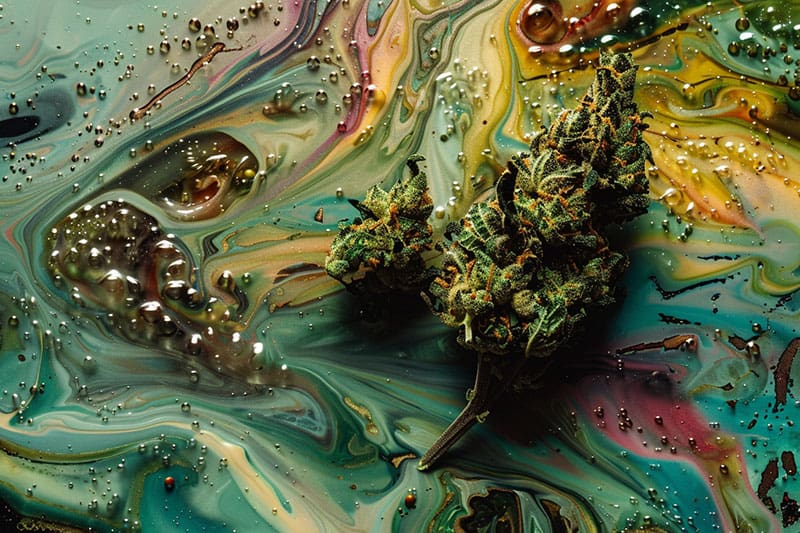
What you should know about hemp-derived cannabinoids and “legal” THC
Editor’s Note: At Sespe Creek, we understand the complexities and concerns surrounding hemp-derived cannabinoids and “legal” THC products. Unlike the unregulated market, purchasing products from us guarantees that your cannabis was sourced ethically and has been lab tested to ensure safety and purity. We prioritize quality, sustainability, and transparency, ensuring that every product meets rigorous standards.
The government’s nonsensical approach to regulating and overtaxing the cannabis market has spurred a complex and potentially harmful issue, the hemp-derived cannabinoid industry.
You may have seen “legal THC” marketed direct-to-consumer online, or Delta-8, THC-P, THC-0, THCA, etc. at head shops and gas stations across the country, especially if you live in a state without a cannabis program.
While cannabinoids like Delta-8 occur naturally in the hemp plant, they’re only present in infinitesimally small amounts that we are unable to isolate naturally. Due to the chemical nature of cannabinoids, it’s easy to chemically transform starting material like CBD into whatever “legal” cannabinoid they’re trying to sell.
The substances that come out of these labs are unregulated, meaning they are not subject to testing for mold, pesticides, or microbials like the cannabis products you would buy in a dispensary.
Product Purity & the 2018 Farm Bill
Due to the uncertain nature of the way these products are created, and how little scientific data there is on the realms these labs are operating in, there’s no telling what’s in these colorful vehicles for psychotropic goo that people are being tricked into consuming thinking they’re the same as regulated cannabis products.
As more and more brands jump ship from the troubled recreational market to the shady world of lab-altered cannabinoids in hopes of finally turning a profit, the government is stepping in, threatening to nix the entire industry with an amendment to the 2018 Farm Bill that would ban all “intoxicating” hemp derivatives, a move regulators hope will close the loophole that allowed for their proliferation in the first place.
Legitimacy of Hemp-Derived Products
When it comes to the legitimacy of these products and the ability of the Farm Bill’s amendment to offer meaningful reform, experts aren’t convinced.
“This market wouldn’t even exist if we had accessible plant products,” said Riley Kirk, a cannabis scientist behind the popular Cannibichem education platform. “In many states across the US we don’t, so people have gotten creative with the 2018 Farm Bill.”
Loopholes in the literature of the Farm Bill–which was initially constructed to protect hemp farmers, not those attempting to skirt the regulated cannabis industry–have allowed people to take something like CBD, which is naturally occurring in the plant, and subject it to acids or other laboratory methods to convert the CBD into other compounds that make you feel high.
Unregulated Markets Undercutting Legal Cannabis
“In a perfect world, there’s nothing harmful about Delta-8 THC,” said Kirk. “It’s actually an extremely medicinally relevant compound. The issue is we don’t have standardization or regulations on what the purity needs to be, or making sure that it’s been tested for all the things that our legal cannabis is tested for.”
While there’s nothing inherently wrong with the cannabinoids themselves, it’s the clean-up of the final product that causes concern.
“It’s important to reisolate your compound of interest so you have a pure final product,” says Kirk. “This is where some labs and companies may not be doing the best job or making sure that the final product is pure and safe and tested and doesn’t have residual chemicals or unknown cannabinoids present.”
She continues, “With a plant-based cannabis product, we may not yet understand every molecule the plant is making, but at least we know it’s natural. When we have a synthetically derived product from a laboratory, we’re not really sure what byproducts are being produced or what components that lab is adding to that product that could make it into the final product sold to consumers.”
Misunderstanding and Overregulation
Because the hemp cannabinoid industry isn’t subjected to the crushing tax structures of legal cannabis, they’re able to dramatically undercut the prices of real cannabis products, and ship them straight to your door.
Hemp shops and websites selling unsafe vapes, edibles, and sprayed flower are thriving as regulated cannabis dispensaries and legitimate brands struggle beneath the weight of broken bureaucracy.
We find ourselves here because the government does not understand how this plant works. Their ignorance created this mess.
Banning certain chemicals in a plant without understanding that they can literally morph into one another shattered a glass ball that cannot be put back together.
Chemical Compounds and Bans
There are thousands upon thousands of chemical compounds in the cannabis plant. We are just beginning to understand their capabilities, medicinally and otherwise. Banning some while leaving others legal creates a whack-a-mole effect with limitless potential.
This Escher-esque maze of nonsense is made all the more absurd by the fact that simply de-scheduling the cannabis plant would solve the entire issue all at once.
“We’ve got authorities that could be making logical recommendations to make this make sense, but they’re not incentivized to do that,” said Nelson Lindsley, a grower and consultant. “They don’t really care.”
“The fundamental issue with all of this is the 0.3% THC,” he says. “Hemp and cannabis are one plant, but the laws have been fragmented around the chemistry of the plant. This is hard to do because plants are living things. Living things adapt and evolve which can lead to unexpected expressions based on epigenetics and environmental factors.”
The Risks of Regulation & Mislead Consumers
He continues, “There is an industry being built around a fickle plant that could overnight shift its genetic expression and become what is legally defined as cannabis instead of hemp. Regulators and government officials are trying to make specific cannabinoids illegal in the hemp industry without a full understanding of the cannabis genome and what drives its chemical potential. And that’s the dumbest thing you could possibly do.”
In addition to the biological quandary this nonsensical regulation has created, there’s the issue that consumers are intentionally misled into consuming these products thinking they are the same as plant-based cannabis products.
Brands struggling to make it on the overtaxed recreational market have been quietly switching the actives in their consumables from natural Delta-9 THC to chemically derived Delta-9 THC, and selling direct-to-consumer online.
Most of the time they do not make the distinction clear on their packaging, and intentionally use cryptic language to get around explaining to their consumers what they’re trying to sell them.
Watching so many respected brands (like Pure Beauty, Rose Delights, and CANN) partake in this workaround has been disheartening. This practice has been especially prevalent in the drink industry, where high production overhead and small consumer numbers make the niche market particularly difficult to excel in financially. It doesn’t help that BevMo just started selling these hemp-derived drinks with absolutely no context outside of advertising that it’s legal to buy weed drinks there now.
Late-Stage Capitalism and Consumer Habits
But why are we so intrinsically receptive to this kind of corporate fuckery? Because this is America, and this is capitalism, and one of the cornerstones of late-stage capitalism is mindless consumption.
Do you ever wonder where the caffeine–another plant-derived intoxicant–in your energy drink came from? Or what that Impossible meat is actually made of? Or what the fuck is in your Elf Bar? These days, processed mystery goo is as American as apple pie used to be.
Banks and e-commerce platforms are profiting off this workaround, too. Suddenly you can use your credit card to buy “weed” online, totally circumventing the fact that cannabis is not federally legal, and cannabis commerce cannot use federal banking systems. Because of this caveat, everyone involved has been begrudgingly missing out on a ton of money for a long time. That is, until now.
“We need retail cannabis to survive and to win, we really do,” said Lindsley. “We need to make it cool and create a thriving ecosystem. Otherwise, all the real brands and dispensaries are going to go away, and it’s all going to be Amazon. Because who’s got a platform already built to push hemp consumables? Jeff Bezos. And he’s just waiting to turn it on and crush small business.”
Rational Conversations and Real Progress
So, what’s the path forward in all of this?
“I don’t know the answer to that,” said Riley Kirk. “There’s a lot of people fighting on both sides. There will be a lot of big conversations, but I hope those conversations lead to real progress as opposed to crushing the entire hemp industry overnight.”
She continued, “If we want to have less of these products, we need to see rational cannabis laws. We need to lower the taxes in the legal cannabis market. We need to have adult-use markets in every single state, and we need home grow. If we had these things, that market would collapse on its own.”

About the Author: Lindsay MaHarry is a journalist and content creator based in California, focusing on the destigmatization of cannabis, psychedelics, and other medicinal plants and fungi. Lindsay’s work has been featured in High Times, Weedmaps, Thrillist, Uproxx, Vice, Merry Jane, Gawker, and Spin Magazine. Follow her @_oystergirl_ on Instagram. For more content, subscribe to Hot Tokes with Oystergirl on Substack.

One quick comment regarding delta 8 THC. It does occur in tiny amounts in the plant, as the article states. Delta 8 THC differs from delta 9 THC only by the position of a single C=C bond. But as a result, delta 9 THC, at the temperature of burning marijuana, is converted to the more chemically stable delta 8 isomer. What little research has been done suggests that there is no significant difference in the effects of delta 8 and delta 9, but one should be aware that the only way to have a “pure” delta 9 effect to ingest the marijuana orally or transdermal patch. If you smoke it, you’re getting all, or essentially all, delta 8 THC.